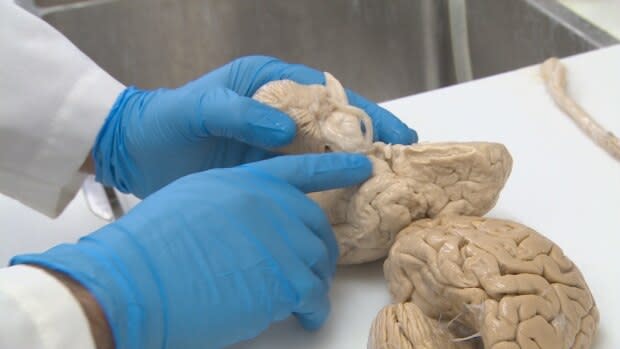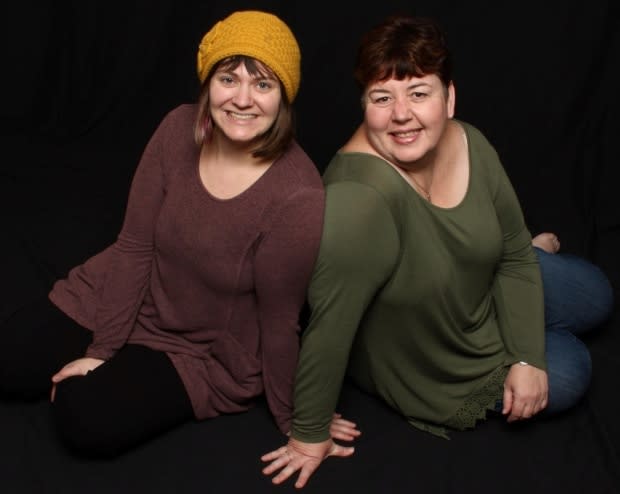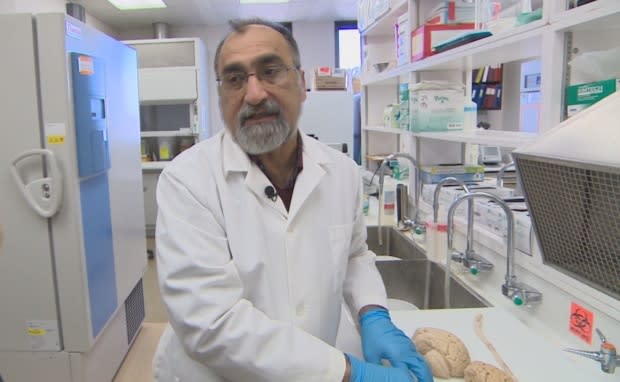'It changes the future': Why this Nova Scotian wants to make brain donation easier
A Lunenburg County woman wants to make it easier for Nova Scotians to donate their brains for research in honour of her dad who had dementia and died a decade ago.
Bernice Williams started the #nobrainer campaign earlier this month to convince the provincial government to add a box for brain donation when people register for a health card or driver's licence.
Her dad, Jackie Williams, was diagnosed with dementia in 2006. His brain was eventually donated to the Maritime Brain Tissue Bank, one of three banks of its kind in Canada.
When Williams visited the brain bank at Dalhousie University, and saw a healthy brain right next to a brain riddled with Alzheimer's, she said it completely changed her view of the disease.
It also helped her understand why her dad no longer knew who she was.
But she soon realized that few people seemed to know that the tissue bank even existed.

"My whole premise is to change the conversation and start talking about research that's as important as organ donation. It changes the future, not the immediate present for someone," Williams said.
Nova Scotia's new presumed consent law means organ donation will soon be automatic, and people who don't want to donate will have to opt out.
But the list of 13 organs available for donation doesn't include the brain because donations for transplants and research are kept separate.
"[Families] have to go through a whole long rigorous process to donate your brain for research, and people just aren't aware," Williams said.
"If the box was there and allowed people to check, what would happen and what could they do if they had 30 brains a month or 300 or 3,000? Where would that level of research take us?"
Right now, if a family wants to donate a loved one's brain to research they have to request an autopsy through a family doctor or specialist at their local hospital. They then have to sign a consent form to get the brain sent to the Maritime Brain Tissue Bank.
The brain bank has collected over 1,300 brain tissues, which are shared with researchers all across the globe.
On average, that's about three brains a month, but it's nowhere near enough, according to Dr. Sultan Darvesh, the director of the brain bank.

He said it would be "hugely beneficial" to have brain tissue donation included with the rest of organ donation.
"Because right now the autopsy rate is very low," Darvesh said. "If we are able to increase the number of these brain tissues donated, that would be wonderful."
He said the brain bank doesn't just need brains from people who've had Alzheimer's or other conditions like Parkinson's or multiple sclerosis. They also need healthy brains so they can compare the two.

Most of the people who donate a brain find out about the work that Darvesh is doing through the Alzheimer's Society or word of mouth, he said.
"In order for us to be able to find a proper diagnostic test and proper cure for Alzheimer's disease we need to have donated human brain tissues to examine. That is fundamentally important," he said.
In an email, a spokesperson for the Department of Health and Wellness said the new presumed consent legislation is focused on donation for transplants, not research.
Heather Fairbairn pointed people to the Maritime Brain Tissue Bank and Dalhousie University for more information on donating brain tissue.
"The decision to donate for transplant or research is deeply personal," she wrote. "We encourage all Nova Scotians to have these important conversations with their loved ones."
Darvesh has been working at the brain bank for more than a decade, and admits it can be frustrating work figuring out how Alzheimer's attacks the brain.
But recently his team discovered an important protein that is found in higher concentrations in a brain with Alzheimer's than it is in a healthy brain. Now, they're working to target the protein so it can be used in a diagnostic test.
"Every experiment that you do does not work," he said. "And after 15 years, you know, of failure after failure something actually does work, it is an exhilarating feeling."
Williams created a video for the #nobrainer campaign thanks to the help of local artist Ashton Rodenhiser. She's hoping people will sign up on her website, so she can see how much support she has for the idea before approaching the province.
She said she's doing this all for her dad.
"It doesn't have to happen in the next two weeks, but it's something that's been on my mind for 10 years," she said. "I haven't given up yet so I'm just going to keep talking about it. It will change. It has to change."
MORE TOP STORIES


